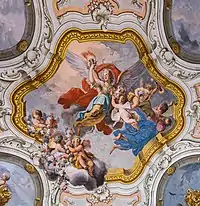Gioacchino Martorana
Gioacchino Martorana (19 August 1736 – 27 November 1779) was a Sicilian painter.[1][2] He was the son of Pietro Martorana and a member of an extended family of decorators and artists from Palermo.[3]
Gioacchino Martorana | |
|---|---|
| Born | 19 August 1736 |
| Died | 27 November 1779 Palermo |

_16_07_2019_18.jpg.webp)
Martorana was born in Palermo, in the Mediterranean island of Sicily. When he was seventeen he went to Rome to study under his father's former pupil Giuseppe Vasi, and also spent time with Marco Benefial.[3] He remained in Rome until the 1770s. He painted many religious subjects; much of his work shows the influence of Sebastiano Conca and of Pompeo Girolamo Batoni. After his return to Palermo he painted a number of portraits, including one of the Sicilian architect Giuseppe Venanzio Marvuglia.[3] He painted frescoes in several palaces of the city, among them Palazzo Comitini, Palazzo Costantino and Palazzo Butera. These late works show the influence of the French Rococo style introduced to Palermo by Elia Interguglielmi.[3]
Martorana died in Palermo on 27 November 1779.[1]
References
- Mariny Guttilla (2008) Martorana, Gioacchino (in Italian). Dizionario Biografico degli Italiani, volume 71. Roma: Istituto dell’Enciclopedia Italiana. Accessed February 2016.
- Martorana, Gioacchino. Benezit Dictionary of Artists. Oxford Art Online. Oxford: Oxford University Press. Accessed February 2016. (subscription required)
- Donatella Germanó Siracusa ([n.d.]). Martorana. Grove Art Online. Oxford Art Online. Oxford: Oxford University Press. Accessed February 2016. (subscription required)